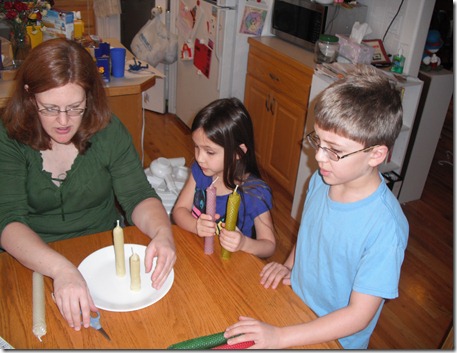This is the most oft asked question I get when people learn that I homeschool. Some people who ask this are hoping to hear some dramatic story of a knock-down-drag-out issue my husband and I had with the public school the kids were previously attending. Some others assume our kids have something wrong with them—socially, intellectually, mentally, emotionally, whatever. Others wonder if we’ve just plain lost our minds or are gluttons for punishment. Sometimes we get the question from people who are considering homeschooling their children and want to know really and truly what led us to our decision.
When I’m asked “Why?”, I find myself assessing the questioner. What are they really looking for? Do I just give a glib answer or do I really go into the many reasons? Which ones? How much time do we have? How well do I know this person? Does it matter to me what they think about my response?
I have a lot of answers to “Why?” and, the longer I homeschool those little precious little punks of mine, the more answers I find. Some are very serious and personal, others are optimistic and hopeful. Some were apparent to me right from the start. Others evolved as we've gone along. Some are selfless. Some are selfish. All are valid.
To begin to answer the question, I have to start with some personal history. I was raised going to public school. Elementary school was great, until about the fourth grade, when I started getting teased and the little girl-cliques were forming. Things got progressively worse through middle school. Verbal jibes turned to pushing, shoving, and tripping. Pushing and shoving turned to scratching and stabbing—with fingernails, metal compasses, writing utensils. I was even bitten, and grabbed in places no one had a right to touch. I was scared, I felt alone, I didn’t feel safe.
When I told the adults in my life what was going on, I was encouraged to ignore what I could, be pleasant no matter what, and ultimately I was brushed off:
“Kids are just mean at this age.”
“Don’t act like a victim and you won’t be treated like one.”
“Things will get better as you get older.”
“Just keep your head down and try not to attract any attention.”
I followed all the advice, putting faith in the adults’ perspective, but it did little good—if anything, my “turning the other cheek” only escalated the abuse.
I started thinking about suicide. I started thinking about hurting the ones who hurt me. I prayed nearly every night that either I would die, or the ones hurting me would. Every day, when I got off the bus, I walked past the wheels and thought about crouching down and letting them roll over me. These thoughts pretty well consumed me until an incident in eighth grade that involved me getting hit over the head repeatedly with a belt buckle by a girl in my speech class. We were actually IN class when this occurred. Terrified of being permanently injured, enraged that no one--not even the teacher--seemed to notice or care, I came unglued.
A classmate was up giving a speech. I leaped out of my seat and stood up in front of the class, interrupting the girl. My teacher demanded to know what I was doing and threatened to fail me. I showed her the lump on my head and pointed out the girl who had given it to me and how she’d done it. The teacher questioned the girl, who denied it. The teacher asked the kids around where I’d been sitting what was going on. For a long time, no one said anything. Finally, one girl acknowledged what had happened. The teacher chewed out my tormentor, and then scolded the class. Then, she asked if I had anything to say.
I let the class have it. All the anger, fear, hurt, sadness, and injustice I felt. I shouted. I swore. I told the class exactly what I thought of them and where they could all go. Bullies and those who stand by and let other people be bullies are the same thing. And that’s what they all were—except for the girl who finally spoke up for me. I thanked her for being brave enough to say something and then I burst into tears. I ran from the class and hid in the bathroom for the rest of the period.
I was sure I would be expelled by the school authorities and lynched by the other students. I was sure I had sealed my doom—I wouldn’t be allowed to call students and even teachers the horrible things I had called them. I decided to kill myself that day and I’d do it on the way home, I’d just walk into oncoming traffic—no, I’d RUN.
I came out of the bathroom expecting the worst. Instead, the girl who had verified the belt buckle accusation came to me; my books and backpack in her hands. She told me after I left, the teacher had lit into the class again and lectured the kids until the bell rang. I wanted to feel happy about this, but I only felt worse, and more determined to put myself out of my own misery. I accepted my things from her and proceeded to my next class.
I remember I was given wide berth for the rest of the day. I don’t remember why I didn’t run into traffic and kill myself. I suppose I was as shocked by my blow-up in speech class as everyone else. I wanted to think about it. I wanted to see if it would mean anything.
After that, things improved—slightly. It helped that I moved three times in the next four years. It helped that I knew if it came to it, I could fight back—or at least make a lot of noise. But I wasn’t able to relax. I still dealt with anxiety and fear and depression. School was not a place of learning for me. It was a place of fear, wariness, and mistrust. Academics and social life came way, way behind self preservation.
I’m happy to say that by the time I was a senior in high school, I had overcome most of that. I had a great senior year, but my grades were shot. It was a wonder I even got into college. I don’t know that I gained much academically from school, but I suppose I learned some important social lessons:
If you don’t fit in, you should be destroyed.
It’s safer to cower in anonymity than defend the persecuted. You might become a target yourself.
Creative thinking and original ideas must be shot down or shut up.
Kids are mean and there’s nothing we can do about it.
Don’t ask for help because you won’t get it.
If no one else acknowledges something bad, it didn’t really happen.
That’s what public school taught me. What a great legacy for our children, eh? That’s what I want my kids to learn. That’ll prepare them for the real world. That will make them good, responsible citizens. That will help them realize their potential as intellectual, creative, spiritual beings. Right?
Wrong. Dead wrong.
Now, I realize that this post is rather heavy. I also realize it makes me sound a little like I might be trying to overprotect my kids—maybe you’re thinking—”Well, you can’t shield them from everything. Eventually, they’ll have to go out into the big, bad world. If they’re too sheltered, they’ll never make it in the real world.”
My response to that is—“Duh.” I’m not trying to protect them from everything. In fact, if you ask my kids, they have life pretty hard. They are frequently disappointed, have their feelings hurt, and I know they’ve felt helpless and alone. They’ve felt pain and injustice—because I make sure they have plenty of opportunities to experience the “real world.” But I also make sure they have plenty of opportunities to learn how to cope:
To turn to God and to people who can help them
To trust their instincts
To treat people with respect and dignity and expect the same from others
To recognize the value of creative, independent thought
To stand up for the right things and to be brave enough to deal with the consequences
To realize they are not alone.
I want my kids to learn these life lessons and I think I’m better equipped to teach my kids these positive, soul-affirming lessons than the public school experience could ever be. But I didn't come to that conclusion right away.
When I first began looking into homeschooling, it was purely for the academic benefits for my kids. My oldest two were already happily enrolled in the local elementary school and I had already decided that my kids would never have the school experience I had because we live in a small community where I know most of the kids' classmates and their parents, I know the teachers, and frankly, I'm pretty optimistic and willing to hope for the best. People are nice and the schools are good. I'm pretty sure I was already raising my kids to know how to deal with the unpleasantries of life. It wasn't until after I'd been homeschooling for awhile, and had been asked to teach the 12 and 13 year old girls at church that I really got thinking about the significance of the events from my middle school years and I became more mindful about "socialization" and how to help my kids get proactively and positively through adolescence.
There are other reasons why I chose to homeschool, and I'm tempted to say this is the first and most significant reason, but that wouldn't be accurate. This is just the reason I was thinking about tonight when I sat down to write.








